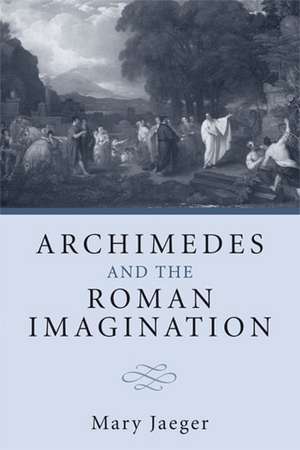Archimedes and the Roman Imagination
Autor Mary Jaegeren Limba Engleză Paperback – 11 sep 2013
By breaking down the narrative of Archimedes' life and examining how the various anecdotes that comprise it are embedded in their contexts, the book offers fresh readings of passages from both well-known and less-studied authors, including Polybius, Cicero, Livy, Vitruvius, Plutarch, Silius Italicus, Valerius Maximus, Johannes Tzetzes, and Petrarch.
Preț: 203.99 lei
Nou
Puncte Express: 306
Preț estimativ în valută:
39.04€ • 40.24$ • 32.96£
39.04€ • 40.24$ • 32.96£
Carte indisponibilă temporar
Doresc să fiu notificat când acest titlu va fi disponibil:
Se trimite...
Preluare comenzi: 021 569.72.76
Specificații
ISBN-13: 9780472035717
ISBN-10: 0472035711
Pagini: 244
Dimensiuni: 152 x 229 x 20 mm
Greutate: 0.4 kg
Editura: UNIVERSITY OF MICHIGAN PRESS
Colecția University of Michigan Press
ISBN-10: 0472035711
Pagini: 244
Dimensiuni: 152 x 229 x 20 mm
Greutate: 0.4 kg
Editura: UNIVERSITY OF MICHIGAN PRESS
Colecția University of Michigan Press
Notă biografică
Mary Jaeger is Professor of Classics at the University of Oregon and author of Livy's Written Rome (University of Michigan Press, 1998).
Recenzii
"Both classicists and historians of science will find this book very interesting and helpful, and I am confident that the stories on Archimedes will stimulate their imagination as they did for his Roman descendants."
--Statmatina Mastorakou, Aestimatio
--Statmatina Mastorakou, Aestimatio
"Archimedes and the Roman Imagination forms a useful addition to our understanding of Roman culture as well as of the reception of science in antiquity. It will make a genuine contribution to the discipline, not only in terms of its original interpretative claims but also as a fascinating example of how we may follow the cultural reception of historical figures."
—Reviel Netz, Professor of Classics, Stanford University, and author of The Shaping of Deduction in Greek Mathematics
"An absolutely wonderful book on a truly original and important topic. As Jaeger explores neglected texts that together tell an important story about the Romans' views of empire and their relationship to Greek cultural accomplishments, so she has written an important new chapter in the history of science. A genuine pleasure to read, from first page to last."
—Andrew Feldherr, Associate Professor of Classics, Princeton University
"This elegantly written and convincingly argued project analyses Archimedes as a vehicle for reception of the Classics, as a figure for loss and recovery of cultural memory, and as a metaphorical representation of the development of Roman identity. Jaeger's fastening on the still relatively obscure figure of the greatest ancient mathematician as a way of understanding cultural liminality in the ancient world is nothing short of a stroke of genius."
—Christina S. Kraus, Professor and Chair of Classics, Yale University
"With her fine eye for structure and detail, Mary Jeager considers what the figure of Archimedes meant for a dozen different authors ranging over fifteen centuries: the genius of Hellenic learning, the Roman celebration and appropriation of that learning, the Roman and Renaissance sense of the fragmentation and loss of the past. It is a fascinating journey."
—Matthew Roller, author of Dining Posture in Ancient Rome: Bodies, Values, and Status
"Jaeger, in her meticulous and elegant study of different ancient accounts of his life and inventions...reveal more about how the Romans thought about their conquest of the Greek world than about 'science'."
—Helen King, Times Literary Supplement
Descriere
An innovative exploration of the cultural reception of the greatest mathematician of the ancient world
